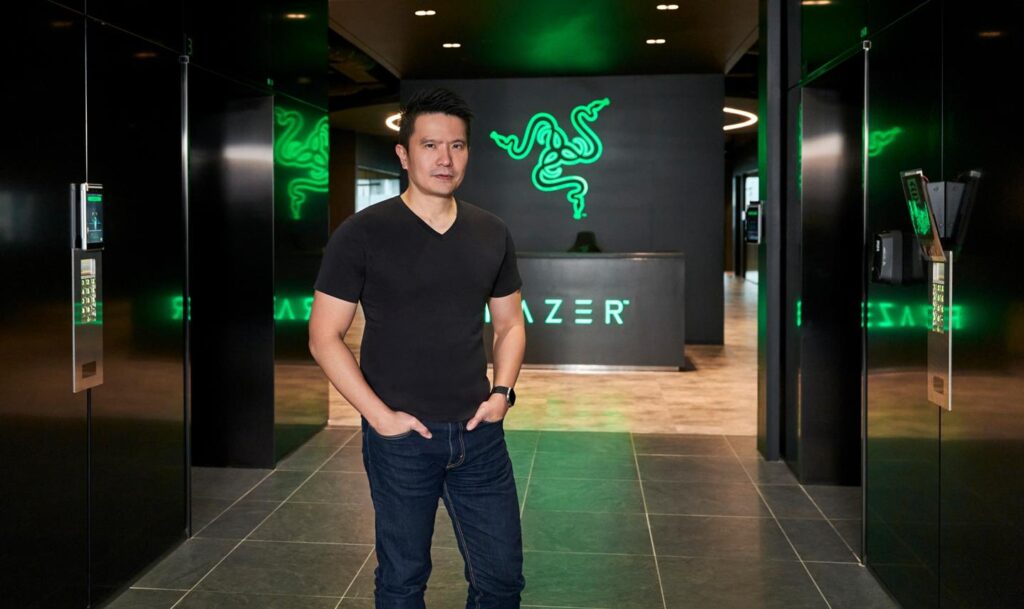
Razer CEO Min-Liang Tan is making a bold bet on artificial intelligence, aiming to revolutionize the gaming industry from the company’s $75 million regional headquarters in Singapore. The move is part of Razer’s strategic pivot as it seeks to expand beyond its core hardware business into AI-driven software solutions.
This development follows the opening of Razer’s AI Centre of Excellence, a significant step in the company’s journey to integrate AI into gaming. The center, located in One-North, Singapore, is a hub for Razer’s AI initiatives, where the company is developing new software tools like QA Co-AI and Game Co-AI. These tools promise to enhance game development and player experience, potentially unlocking new revenue streams for Razer.
AI: The New Frontier for Razer
Razer’s push into AI comes at a time when the gaming hardware market, valued at $42 billion, is experiencing sluggish growth. According to PitchBook’s senior research gaming analyst Eric Bellomo, the industry is grappling with higher costs and inflation-hit consumer spending. In contrast, the AI in game development market is on a growth trajectory, projected to expand from $2.3 billion in 2023 to $28 billion by 2033, according to Market.US.
Min-Liang Tan, Razer’s CEO, is confident that AI will disrupt the gaming industry. “We believe that AI gaming is going to completely disrupt all of the game industry. And we want to be at the forefront of it,” he states.
Strategic Shift: From Hardware to Software
Razer’s strategic shift is not without precedent. The company, co-founded by Tan in 2005, initially built its reputation on high-performance gaming hardware. However, Tan has long been interested in expanding Razer’s software capabilities. In 2006, Razer launched Synapse, a cloud-based platform that allowed gamers to store their settings online, laying the groundwork for future software innovations.
Razer’s new AI tools, QA Co-AI and Game Co-AI, are designed to streamline game development and enhance player experience. QA Co-AI aims to speed up game testing and reduce production costs, while Game Co-AI provides real-time coaching to players. These tools are currently in beta testing and are expected to launch globally by the end of the year.
Investor Interest and Market Potential
Razer’s AI ambitions have caught the attention of investors, including CVC Capital Partners and billionaire board member Lim Kaling. The company, which was taken private in a $3.2 billion deal in 2022, is eyeing a potential return to the public markets. Harnessing AI could boost Razer’s earnings and valuation, making it an attractive proposition for investors.
However, the company faces stiff competition in the AI gaming tools space. Established players like Unity Technologies and Keyword Studios already dominate the market, while companies like Tencent and Krafton are leveraging AI to create immersive gaming experiences.
The Road Ahead for Razer
Despite the challenges, Tan remains optimistic about Razer’s AI future. The company plans to hire 150 AI specialists in Singapore and establish AI hubs in Europe and the U.S. Razer’s AI tools are built on a mix of proprietary and third-party models, allowing the company to remain flexible and responsive to industry trends.
As Razer continues to develop its AI capabilities, the company is poised to transform from a hardware-heavy player into a high-margin software services platform. “Within the next couple of years, I would expect that AI game revenues would be a significant part of our revenues,” Tan predicts.
Razer’s journey into AI is a testament to the company’s commitment to innovation and its ability to adapt to changing market dynamics. As the gaming industry evolves, Razer is positioning itself as a leader in AI-driven gaming solutions, ready to capitalize on the opportunities that lie ahead.







